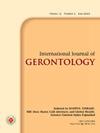老年营养不良住院患者抑郁的危险因素
IF 0.3
4区 医学
Q4 GERIATRICS & GERONTOLOGY
引用次数: 0
摘要
背景:影响营养不良住院老年患者抑郁的因素缺乏相关信息。我们的目的是确定这些患者抑郁的风险和影响因素。方法:对2018年土耳其伊斯坦布尔125例老年营养不良患者进行前瞻性描述性研究。迷你营养评估(简称)用于确定参与者的营养状况,老年抑郁量表(简称)用于确定参与者的抑郁状况。结果:研究中发现营养状况与抑郁风险呈负相关(p: 0.000;接待员:-0.558)。52.8%的患者存在抑郁症。女性占60.8%,男性占39.2%。BMI评分、性别、婚姻状况、文化程度、生活方式和居住地、是否存在慢性疾病、是否使用慢性药物、住院时间、活动程度等因素影响老年患者抑郁症的发生和严重程度(p < 0.005)。多因素回归分析显示,女性(OR: 24.665, 95% CI: 5.83-104.34)、婚姻状况(OR = 11.97, 95% CI: 3.51-40.86)、动员(OR: 9.52, 95% CI: 1.79-50.71)和营养不良(OR = 0.49, 95% CI: 0.27-0.89)会增加抑郁风险。结论:老年营养不良患者抑郁发生率较高。此外,许多因素(如低体重指数,女性性别,动员等)影响它在医院。因此,对患者的密切随访非常重要。本文章由计算机程序翻译,如有差异,请以英文原文为准。
Risk Factors for Depression in Hospitalized Elderly Patients with Malnutrition
Background: There is a lack of information about the factors that affect depression in hospitalized geriatric patients with malnutrition. We aimed to determine the risk and influencing factors of depression in these patients. Methods: The prospective, descriptive study was conducted on 125 elderly patients with malnutrition in Istanbul, Turkey in 2018. The Mini Nutritional Assessment-short form was used in determining the nutritional statuses of the participants, and the Geriatric Depression Scale-short form was used for the status of depression. Results: A negative relationship was found between nutritional status and risk of depression in the study (p: 0.000; r: -0.558). Depression was detected in 52.8% of the patients. 60.8% were women and 39.2% were men. It was also found that BMI scores, gender, marital status, level of education, lifestyle and location, the existence of chronic diseases, chronic medication use, hospital stay period, and mobilization affect the emergence and severity of depression in geriatric patients (p < 0.005). Multivariate regression analysis showed that increased risk of depression occurs with female gender (OR: 24.665, 95% CI: 5.83-104.34), marital status (OR = 11.97, 95% CI: 3.51-40.86), mobilization (OR: 9.52, 95% CI: 1.79-50.71) and malnutrition (OR = 0.49, 95% CI: 0.27-0.89). Conclusions: Depression was frequent in elderly patients with malnutrition. Also, many factors (e.g. low BMI, female gender, mobilization etc.) affect it in hospital. Therefore, close follow-up of patients is important.
求助全文
通过发布文献求助,成功后即可免费获取论文全文。
去求助
来源期刊
CiteScore
0.60
自引率
0.00%
发文量
0
审稿时长
6-12 weeks
期刊介绍:
The Journal aims to publish original research and review papers on all fields of geriatrics and gerontology, including those dealing with critical care and emergency medicine.
The IJGE aims to explore and clarify the medical science and philosophy in all fields of geriatrics and gerontology, including those in the emergency and critical care medicine. The IJGE is determined not only to be a professional journal in gerontology, but also a leading source of information for the developing field of geriatric emergency and critical care medicine. It is a pioneer in Asia.
Topics in the IJGE cover the advancement of diagnosis and management in urgent, serious and chronic intractable diseases in later life, preventive medicine, long-term care of disability, ethical issues in the diseased elderly and biochemistry, cell biology, endocrinology, molecular biology, pharmacology, physiology and protein chemistry involving diseases associated with age. We did not limit the territory to only critical or emergency condition inasmuch as chronic diseases are frequently brought about by inappropriate management of acute problems.

 求助内容:
求助内容: 应助结果提醒方式:
应助结果提醒方式:


